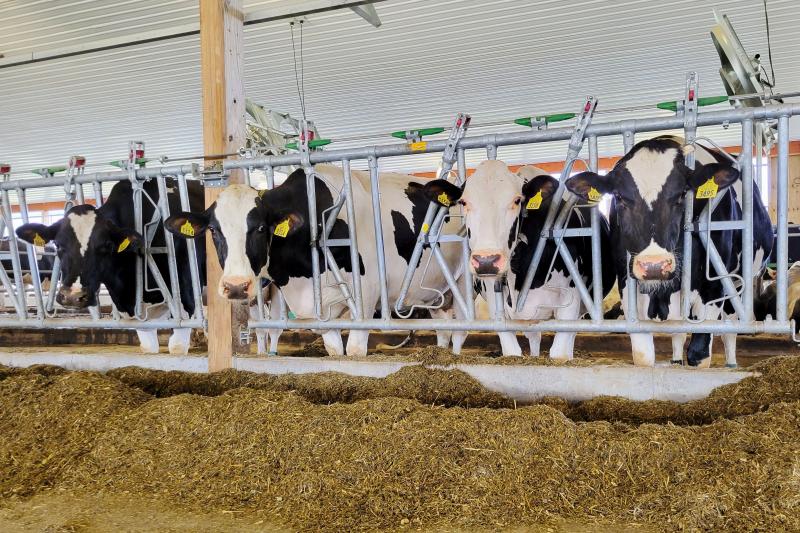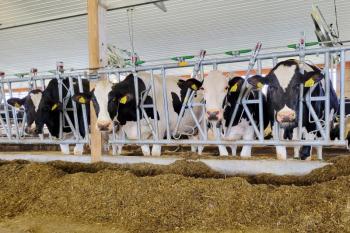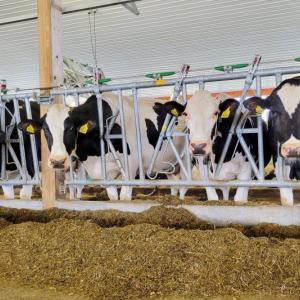$10M announced to support algae-feed research for US Dairy
 Cows at the Miner Institute in New York eat a mixed feed, balanced to meet their dietary needs. A new $10 million grant from the USDA, led by Nichole Price with Bigelow Laboratory and Colby College, will fund research into developing new algal-based supplements that could be added to feed to improve milk production and environmental sustainability. Photo by William H. Miner Agricultural Research Institute
Cows at the Miner Institute in New York eat a mixed feed, balanced to meet their dietary needs. A new $10 million grant from the USDA, led by Nichole Price with Bigelow Laboratory and Colby College, will fund research into developing new algal-based supplements that could be added to feed to improve milk production and environmental sustainability. Photo by William H. Miner Agricultural Research Institute
 Cows at the Miner Institute in New York eat a mixed feed, balanced to meet their dietary needs. A new $10 million grant from the USDA, led by Nichole Price with Bigelow Laboratory and Colby College, will fund research into developing new algal-based supplements that could be added to feed to improve milk production and environmental sustainability. Photo by William H. Miner Agricultural Research Institute
Cows at the Miner Institute in New York eat a mixed feed, balanced to meet their dietary needs. A new $10 million grant from the USDA, led by Nichole Price with Bigelow Laboratory and Colby College, will fund research into developing new algal-based supplements that could be added to feed to improve milk production and environmental sustainability. Photo by William H. Miner Agricultural Research Institute
A new $10 million grant will bolster research into algae-based feed supplements that could increase environmental sustainability in the dairy industry while improving milk production. The five-year grant from USDA Sustainable Agriculture Systems Program will support a research team, led by Nichole Price with Bigelow Laboratory for Ocean Sciences and Colby College, as it tests algal feed additives and assess the product’s impact on animals, farms, communities, and the planet.
As the Earth warms and its population grows, pressure is mounting to optimize our food production and decrease its impact on the planet. Milk production in the United States has quadrupled in the past century, and the demand for dairy continues to grow globally. These new funds will support research into algae-based feed supplements that aim to balance quality milk production with environmental, economic, and social sustainability.
“This grant allows us to bring together a multidisciplinary team of world-class experts in their fields,” said Price, the project director. “This is a team that has already been working well together for several years on finding pointed solutions for sustainability within the cattle industry. Now, we can expand our scope and work together on a whole-systems approach to sustainably enhance U.S. milk production.”
Price is a senior research scientist at Bigelow Laboratory and holds a research faculty appointment at Colby College. This is the largest government-funded research grant in the college’s history. The project team includes researchers from Syracuse University, University of New Hampshire, University of Vermont, Clarkson University, and William H. Miner Agricultural Research Institute. The collaboration will also support substantial teaching and extension projects.
Recent research has shown that certain algae-based feed additives reduce cows’ methane-emitting burps, and can be produced with a lower carbon footprint than land crops. They also allow for increased potential to recycle and recapture nutrients in the feed production process. Further studies show that microscopic algae can offer similar benefits, and could provide a scalable solution for farms of all sizes.
To turn these scientific findings into an economic opportunity, a team of economists and other social scientists will look at how to integrate the product into the supply chain, make it profitable for each stakeholder, and foster its adoption through community outreach and decision-making tools.
“The supplement may work perfectly, but it can only be a real solution if supply chain actors will buy it and farmers adopt it,” said University of Vermont Professor of Community Development and Applied Economics David Conner, a collaborator on the project. “In order to succeed, we have to make sure the entire process is economically resilient and can survive market shocks, support dairy production, and promote a healthy agricultural economy.”
Feed trials will investigate the impact of algal ingredients on an array of cows and farms. By testing supplements with feeds available in different geographic areas, researchers can develop a nutritious additive that is widely applicable and more impactful. In conjunction, the researchers will also evaluate the supplement’s impact on the cows’ wellbeing.
"Animal welfare holds an important place in animal agriculture. Farmers care a lot about their cows and the health of their animals directly relates to their productivity," said Research Scientist Sarah Morrison, a collaborator at William H. Miner Agricultural Research Institute. "We need to ensure that the supplements we develop do not have a negative effect on the cows and, in turn, the farm’s success. The goal of this project is to develop a sustainable and effective product, while hopefully even improving cows’ welfare."
The team will also be looking at how the new supplement impacts greenhouse gas emissions at each stage of production and distribution, ensuring a whole-systems understanding of its impact on the industry's carbon footprint. These life cycle assessments will enable the researchers to seek the best balance of greenhouse gas emissions with milk yield and quality.
“To find a real solution, the process has to be assessed economically and environmentally at every step along the way,” said Bigelow Laboratory Senior Research Scientist Steve Archer, a co-lead on the project. “We're striving to develop products that are a benefit to industry and the planet, it's essential that those two criteria go hand in hand."
Bigelow Laboratory for Ocean Sciences is an independent, nonprofit research institute located in East Boothbay, Maine. From the Arctic to the Antarctic, Bigelow Laboratory scientists use innovative approaches to study the foundation of global ocean health and unlock its potential to improve the future for all life on the planet. Learn more at bigelow.org, and join the conversation on Facebook, Instagram, and Twitter.






















